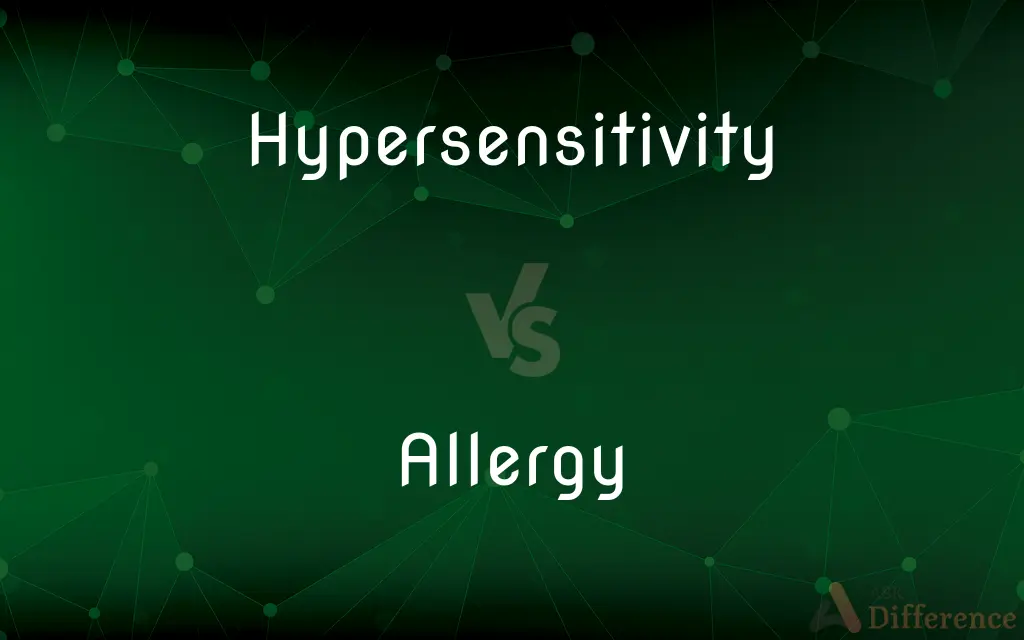Hypersensitivity vs. Allergy — What's the Difference?
By Fiza Rafique & Maham Liaqat — Updated on May 7, 2024
Hypersensitivity refers to an exaggerated response by the immune system to various stimuli, while allergies specifically involve an immune reaction to harmless substances seen as threats.

Difference Between Hypersensitivity and Allergy
Table of Contents
ADVERTISEMENT
Key Differences
Hypersensitivity encompasses a broader range of immune responses, including reactions that may not involve allergens, such as reactions to drugs or autoimmune diseases. Allergies, on the other hand, are a specific type of hypersensitivity reaction that specifically targets harmless environmental substances like pollen or pet dander.
Hypersensitivity can be classified into four types based on the immune mechanisms involved. While allergies represent Type I hypersensitivity, which is mediated by IgE antibodies that lead to immediate reactions, other types of hypersensitivity involve different immune pathways and responses.
In hypersensitivity, symptoms can vary widely depending on the type and severity, ranging from mild irritation to severe tissue damage. In contrast, allergic reactions typically manifest as predictable symptoms such as sneezing, itching, and swelling in response to exposure to specific allergens.
The diagnosis of hypersensitivity might require a range of tests to understand the underlying immune mechanisms, including blood tests, skin tests, and challenge tests. Allergies are usually diagnosed using specific tests like skin prick tests or serum-specific IgE tests, which identify reactions to particular allergens.
Management of hypersensitivity could involve avoiding known triggers, using medications like antihistamines, corticosteroids, or immunotherapy, depending on the type. Allergic reactions are often managed by avoidance of allergens, and treatments are more specific, such as the use of EpiPens for severe reactions.
ADVERTISEMENT
Comparison Chart
Definition
Broad immune response to stimuli
Immune response to harmless substances
Types
Four types (I, II, III, IV)
Primarily Type I
Symptoms
Vary by type; range from mild to severe
Predictable (sneezing, itching, etc.)
Diagnostic Tests
Blood tests, skin tests, challenge tests
Skin prick tests, specific IgE tests
Treatment
Medications, avoidance, immunotherapy
Avoidance, EpiPens, specific medication
Compare with Definitions
Hypersensitivity
An immune response that is improperly amplified.
Hypersensitivity to pollen can exacerbate during spring.
Allergy
Symptoms include itching, swelling, and respiratory distress.
Spring brings about allergy symptoms like sneezing and watery eyes.
Hypersensitivity
Managed through a variety of medical approaches.
Doctors recommended a combination therapy to manage her hypersensitivity.
Allergy
An immune reaction to substances that are generally harmless.
Her peanut allergy requires her to carry an EpiPen.
Hypersensitivity
Reaction types ranging from immediate to delayed.
Hypersensitivity reactions might not appear until hours after exposure.
Allergy
Mediated by IgE antibodies specific to allergens.
Allergy testing confirmed his sensitivity to cat dander.
Hypersensitivity
Can involve non-allergic and allergic mechanisms.
Some hypersensitivities are due to autoimmune processes.
Allergy
Often treated with antihistamines and avoidance.
Allergy sufferers often find relief through over-the-counter medications.
Hypersensitivity
A condition where the immune system reacts excessively to a stimulus.
After his diagnosis, Kyle avoided certain medications due to his hypersensitivity.
Allergy
Specific to allergens like pollen, food, or dust.
Learning about her dust allergy led her to clean more frequently.
Hypersensitivity
Hypersensitivity (also called hypersensitivity reaction or intolerance) refers to undesirable reactions produced by the normal immune system, including allergies and autoimmunity. They are usually referred to as an over-reaction of the immune system and these reactions may be damaging and uncomfortable.
Allergy
Allergies, also known as allergic diseases, are a number of conditions caused by hypersensitivity of the immune system to typically harmless substances in the environment. These diseases include hay fever, food allergies, atopic dermatitis, allergic asthma, and anaphylaxis.
Hypersensitivity
Highly or excessively sensitive.
Allergy
A condition in which exposure to a substance, such as pollen, latex, animal dander, or a particular food or drug, causes an overreaction by the immune system that results in symptoms such as sneezing, itching, rash, and difficulty breathing or swallowing.
Hypersensitivity
Responding excessively to the stimulus of a foreign agent, such as an allergen.
Allergy
(Informal) An adverse sentiment; antipathy
An allergy to cocktail parties.
Hypersensitivity
Any heightened immune response to an antigen; an allergy; hypersensation.
Allergy
A disorder of the immune system causing adverse reactions to substances (allergens) not harmful to most and marked by the body's production of histamines and associated with atopy, anaphylaxis, and asthma.
Hypersensitivity
The state of being easily offended or hurt.
Allergy
(pathology) Any condition of hypersensitivity to a substance.
Hypersensitivity
Pathological sensitivity
Allergy
Altered susceptibility to a first treatment as exhibited in reaction to a subsequent one.
Hypersensitivity
Extreme sensitivity
Allergy
(informal) An antipathy, as toward a person or activity.
He has an allergy to reality TV.
Allergy
Hypersensitivity to a particular substance.
Allergy
Hypersensitivity reaction to a particular allergen; symptoms can vary greatly in intensity
Common Curiosities
What causes allergies?
Allergies are caused by the immune system mistakenly identifying harmless substances as threats and reacting to them.
How many types of hypersensitivity are there?
There are four types of hypersensitivity, classified based on the different immune mechanisms involved.
What is hypersensitivity?
Hypersensitivity is an exaggerated immune response to various stimuli, which can include allergens and non-allergenic substances.
Can allergies be cured?
Allergies cannot typically be cured but can be managed through avoidance of allergens and medical treatment.
What are common allergens that trigger allergic reactions?
Common allergens include pollen, pet dander, certain foods, and dust mites.
How are hypersensitivity reactions treated?
Treatment varies widely and may include avoidance of triggers, medications, and in some cases, immunotherapy.
How is an allergy diagnosed?
Allergies are diagnosed using skin prick tests, blood tests measuring specific IgE, and sometimes through exposure tests under medical supervision.
What are immediate hypersensitivity reactions?
Immediate hypersensitivity reactions occur quickly after exposure to an allergen and are typically mediated by IgE antibodies.
What is the difference between an allergy and other types of hypersensitivity?
An allergy is a Type I hypersensitivity involving IgE antibodies and specific allergens, whereas other types can involve different immune cells and mechanisms.
Can someone have both allergies and other types of hypersensitivity?
Yes, it's possible for someone to have both allergic reactions and other types of hypersensitivity responses.
What are delayed hypersensitivity reactions?
Delayed hypersensitivity reactions are mediated by cells and occur hours to days after exposure to the antigen.
Can children outgrow allergies?
Some children may outgrow certain allergies, especially to foods, as they age.
Are there any preventive measures for hypersensitivity?
Preventive measures include avoiding known triggers, using protective measures, and in some cases, undergoing immunotherapy to reduce sensitivity.
What symptoms indicate an allergic reaction?
Typical symptoms of an allergic reaction include hives, swelling, itching, and respiratory issues.
Are hypersensitivity reactions dangerous?
Hypersensitivity reactions can range from mild to life-threatening, depending on the type and severity.
Share Your Discovery

Previous Comparison
Stir vs. Agitate
Next Comparison
King vs. ChiefAuthor Spotlight
Written by
Fiza RafiqueFiza Rafique is a skilled content writer at AskDifference.com, where she meticulously refines and enhances written pieces. Drawing from her vast editorial expertise, Fiza ensures clarity, accuracy, and precision in every article. Passionate about language, she continually seeks to elevate the quality of content for readers worldwide.
Co-written by
Maham Liaqat












































